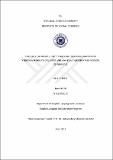DSpace Repository
THE FALL OF MASCULINITY THROUGH TRANSFIGURATION IN VIRGINIA WOOLF’S ORLANDO AND ANGELA CARTER’S THE PASSION OF NEW EVE
JavaScript is disabled for your browser. Some features of this site may not work without it.
| dc.contributor.author | Sacır, Işın
|
|
| dc.date.accessioned | 2019-05-26T10:17:40Z | |
| dc.date.available | 2019-05-26T10:17:40Z | |
| dc.date.issued | 2017 | |
| dc.identifier.uri | http://hdl.handle.net/11547/2189 | |
| dc.description.abstract | Yüzyıllar boyunca fiziksel ve toplumsal cinsiyet olguları, insanlar “kadın” ve “erkek” stereo tipleri olarak keskin hatlarla birbirinden ayrıldığı için tüm dünyada bilinen en eski tartışmaların değişmez konusu olmuştur. Oysaki Judith Butler’ın da ortaya koyduğu üzere; cinsiyet ‘akışkandır’ ve cinsiyet kavramına çok daha geniş bir açıdan bakılmalıdır. Ancak ve ancak geleneksel cinsiyet kalıplarının dışına çıkmayı başardığımızda cinsiyetin akışkanlık özelliğini görebiliriz ve işte o zaman ‘cinsiyet değiştirme’, “başkalaşım” ve “dönüşüm” gibi cinsiyet bağlantılı diğer kavramlar dikkatimizi çeker. Angela Carter’ın The Passion of New Eve, Virginia Woolf’un Orlando adlı romanları; cinsiyet değiştirme yoluyla, fiziksel ve toplumsal cinsiyet rolleri arasındaki keskin sınırları ortadan kaldıran, geleneksel cinsiyet rollerini yıkan eserlerdir. Bir yandan, Angela Carter romanındaki iki ana karakterin, Evelyn ve Tristessa’nın cinsiyet değiştirmesiyle; fallus merkezli dilin hiyerarşik yapısını yıkar. Diğer yandan, Virginia Woolf ana karakterin biçim değiştirme yoluyla farklı cinsiyet rollerini deneyimlediği belirsiz bir dünyayı kurgulayarak katı erkek egemen dünyayı eritir. Bu bilgilerin ışığında, bu tezde; Judith Butler’ın cinsel kimliğin edimselliği ve Michel Foucault’nun güç- arzu ilişkisi teorilerinin yardımıyla, Virginia Woolf’un Orlando ve Angela Carter’ın The Passion of New Eve adlı romanlarındaki karakterlerin biçim ve cinsiyet değiştirmelerinin sebep ve sonuçlarından yola çıkılarak, güç dengelerinin nasıl yer değiştirdiği ve bunun cinsiyet kavramıyla nasıl ilişkilendirildiği, analiz edilecektir. | tr_TR |
| dc.language.iso | tr | tr_TR |
| dc.publisher | ISTANBUL AYDIN UNIVERSITY INSTITUTE OF SOCIAL SCIENCES | tr_TR |
| dc.subject | Feminizm | tr_TR |
| dc.subject | Toplumsal cinsiyet | tr_TR |
| dc.subject | Cinsiyet değiştirme | tr_TR |
| dc.subject | Başkalaşım | tr_TR |
| dc.subject | Performatif cinsiyet | tr_TR |
| dc.subject | Feminism | tr_TR |
| dc.subject | Gender | tr_TR |
| dc.subject | Transformation | tr_TR |
| dc.subject | Transfiguration | tr_TR |
| dc.subject | Gender performativity | tr_TR |
| dc.title | THE FALL OF MASCULINITY THROUGH TRANSFIGURATION IN VIRGINIA WOOLF’S ORLANDO AND ANGELA CARTER’S THE PASSION OF NEW EVE | tr_TR |
| dc.type | Thesis | tr_TR |
| dc.description.abstractol | Throughout centuries, ‘sex and gender’ phenomena have always been the unvarying subject of the primordial argument in the whole world, as people have been put into hard-edged stereotypes under the title of two certain roles “man” and “woman”. However, as Judith Butler would also put it “gender is fluid” and we need to look at it from a broader perspective. Only if we remove the borders of traditional gender roles, can we see the fluidity and realize that there are also other gender related aspects like “Transgenderism”, “Transfiguration” and “Transformation”. The Passion of New Eve by Angela Carter and Orlando by Virginia Woolf are two works which abolish the ‘hard-edged’ borders and deconstruct the traditional gender roles through Transfiguration. On the one hand, Angela Carter breaks down the hierarchical structure of the phallocentric, language, through ‘transformation’ of the two characters in her novel, Evelyn and Tristessa. On the other hand, Virginia Woolf melts down the solidity of the male centred world by fictionalising an ambiguous world where the main character experiences different gender roles via transfiguration. This study will account for how the balance of power replaces, how the concept of gender is associated with this balance of power with the help of Judith Butler’s gender performativity and Michel Foucault’s power-pleasure relationship theories by looking at the reasons and results of the transfiguration and the transformation of the characters in Virginia Woolf’s Orlando and Angela Carter’s The Passion of the New Eve. | tr_TR |
| dc.publisher.firstpagenumber | 1 | tr_TR |
| dc.publisher.lastpagenumber | 96 | tr_TR |
Files in this item
This item appears in the following Collection(s)
-
Tezler -- Thesis [3470]
